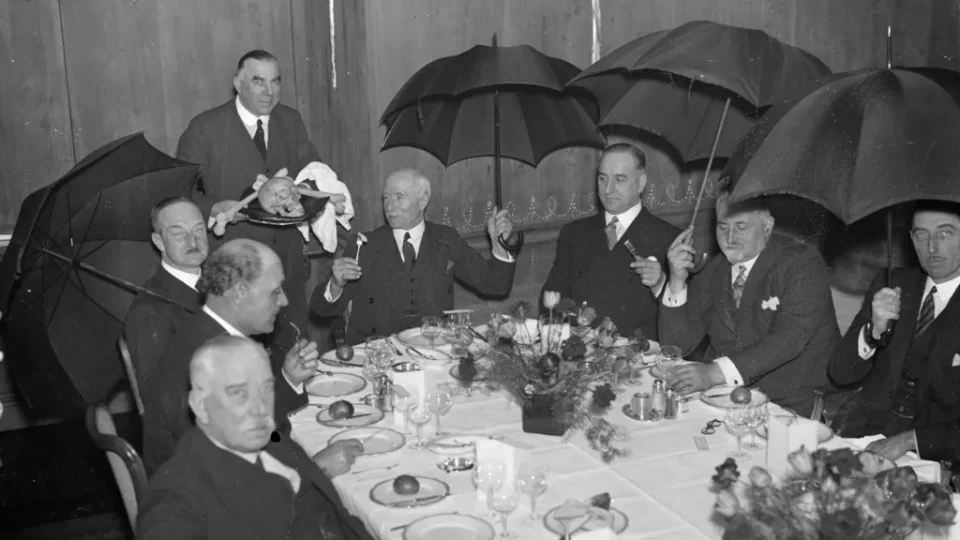Towards the end of 1890, several gentlemen from London received a warm invitation to become members of a new dining society.
So far, this seems quite ordinary.
However, the club featured a unique theme – it aimed to challenge the belief in bad luck omens.
In a particularly grandiose fashion, the Thirteen Club piled superstition upon superstition, striving to disprove the idea that incidents like broken mirrors, spilled salt, and walking beneath ladders could predict or cause misfortune.
The original Thirteen Club was founded in New York in 1882, quickly gaining popularity.
Eager to partake in the revelry experienced by their American counterparts, William Harnett Blanch, a writer and historian from Camberwell, got busy.
He assembled his members and scheduled meetings for the 13th of each month, with dinner tables set for 13 guests—naturally—and adorned with peacock feathers, thought to carry bad luck due to their association with the evil eye.
The meals were served by cross-eyed waiters “as much as possible, though the number of such individuals available was found to be insufficient for every table in the room.”
The commencement of dinner was marked by the deliberate crashing of two mirrors onto the floor, and attendees had to follow an undertaker beneath a ladder before receiving umbrellas to open while indoors.
Mr. Blanch initiated the meetings by reading letters from notable supporters— a varied assembly including the attorney general and the headmaster of Harrow School, who noted, “Superstition has plagued human existence, and I’m delighted you seek to eliminate it,” as well as the president of the Royal Institute of Painters in Watercolour.
Oscar Wilde was among those who declined an invitation, stating, “I adore superstitions. They are the antithesis of practicality.”
His response to Blanch’s invitation went on: “Practicality opposes romance. The purpose of your society appears rather dreadful. Please, let us keep some fantasies. Don’t make us unbearably rational.
“I enjoy dining out, but I cannot participate in a society with such a malevolent agenda. I regret this, and I suspect you’ll all be delightful company, yet I cannot attend, though 13 is a fortunate number.”
This “rebuttal of superstition” drew attention from various newspapers.
One journalist queried Blanch, “Do you have any fondness for even the gentlest of superstitions?”
Blanch’s strong retort was: “Not in the slightest. I like having may blossom in my home; I find opals to be beautiful; the moon viewed through glass brings me joy; spilling salt doesn’t bother me; and I always walk beneath ladders. Let superstition be dismissed!”
(May blossom, or hawthorn, was deemed unlucky indoors, with reports from 1866 citing the scent resembling that of corpses, similar to the smell of the Great Plague of London. Opals were also considered unlucky, possibly due to medieval beliefs linking them to the “evil eye.” Seeing the moon through glass refers to viewing a new moon in a mirror which creates an inverse image; compared to other superstitions, the primary risk seems to be the prophecy that the viewer might break a dish. Spilling salt, viewed historically as valuable, was itself considered bad luck, opening the door to devilry unless countered by tossing it over one’s left shoulder. There were also beliefs that walking under a ladder disrespects the notion of the Holy Trinity formed by the ladder leaning against a wall and the ground, thereby inviting misfortune.)
The London events gained enough notoriety to attract global coverage.
Several Australian publications, including the Riverine Grazier, Mackay Mercury, and Dubbo Dispatch, featured articles on them during the 1890s and early 1900s.
The Sunday Times in Sydney went a step further and fashioned its own experiment by placing two ladders on the street to observe people’s reactions.
The test was conducted outside a theater, due to the superstition commonly associated with actors.
“Artiste Claude Bantock purposefully chose to stroll beneath the rungs, seemingly reveling in it! Meanwhile, musical director Andrew MacCunn, known for smoking one cigarette from another, strategically avoided the evil influence of the ladder. Miss Jessie Lonnen, however, glided beneath it without a second thought.”
(In this context, a Gaby glide was a fashionable dance move named after Parisian performer Gaby Deslys.)
During half an hour, 130 individuals navigated the area, and of these, merely 17 intentionally avoided the ladder.
A small boy in a telegraph messenger’s uniform even decided to perform exercises on it, while several other young errand runners appeared blissfully unaware of the superstition.
The journalist concluded that 12 of the 17 ladder-avoiders were women, positing that the belief “seems to survive predominantly among the fairer sex.”
It appeared that the citizens of Sydney were an elaborately dressed bunch, with the reporter showcasing a keen eye for detail.
“One girl, who nearly dragged her friend out from beneath the ladder, was noted to be wearing a large opal pendant, suggesting she didn’t subscribe to the superstitions surrounding this stone. Another passerby, Miss Irene Browne, donned bright green—a color traditionally viewed as unlucky—and yet another woman flaunted a peacock feather in her hat!”
The China Mail even suggested that women were “more superstitious than men.”
The writer, in a not-so-subtle manner, continued: “This has been confirmed through diligent observation. If you reflect on it, you can verify it by recalling the peculiar little habits your female acquaintances display to ward off misfortune.”
“Careful notes,” however, are not regarded as solid evidence for sweeping generalizations based on gender today.
The London club continued thriving as late as 1928, when special guests were invited to speak. Sir Arbuthnot Lane, then president of the Fellowship of Medicine, spoke on the benefits of wholemeal bread, arguing that a “virile race” could not be raised on white bread.
The 1928 gathering also featured a young George Robey—an English music-hall comedian renowned for being dubbed “the prime minister of mirth.”
The menu for that year’s dinner, designed by chairman Henry Furniss—a former cartoonist at Punch magazine—received accolades from the Sphere newspaper (though it’s unclear why the journalist believed a drawn witch needed her beauty assessed).
“Printed on vibrant red cardboard, it depicted a striking young witch soaring through the clouds on her broom, with objects below such as an owl, a spider, a horseshoe, an overturned salt cellar, crossed knives, a crowing rooster, a wild cat, and a ghastly imp scurrying under a ladder.”
Wilde wasn’t the only one wanting to leave superstition alone; a concerned reader wrote to the Daily Mail in 1926 stating, “Every heart knows its own sorrow, and mocking others’ beliefs isn’t proper. Smashing mirrors, spilling salt, and playing with human remains at a festive gathering won’t appeal to health-minded individuals.”
Despite the misgivings about a healthy mindset, the Thirteen Club’s bold defiance against superstition seemed to have little impact on the physical well-being or fortunes of its members.
Both the London and New York clubs maintained that their members enjoyed good health and prosperity. Blanch asserted that only one individual from his London chapter had passed away since its inception four years prior, and that member had not settled his dues.
However, this alleged good fortune raised questions when a correspondent penned a letter to The Times in 1894.
“Sir,
“I’m utterly perplexed about how this combats—let alone annihilates—superstition. Surely, the most unfortunate and superstitious individuals could hardly anticipate bad fortune to follow a meticulously planned dinner gathering, no matter how artistically executed.
“Bad luck, courteously invited for dinner alongside carefully chosen guests, would understandably leave its fateful instruments, along with its hat and umbrella, at the door.
“The essence—if superstition carries any merit—lies in the random occurrence of events, whether fortunate or unfortunate. Hence, a prearranged event showcasing lucky or unlucky actions holds no real significance.
“Yours respectfully,
“M J.”
The Thirteen Club appeared to diminish after the onset of World War Two, with the last known reports surfacing in 1939. Perhaps the act of making light of superstitions, coupled with coffin-shaped table decorations, felt a little too inappropriate, regardless of luck.


